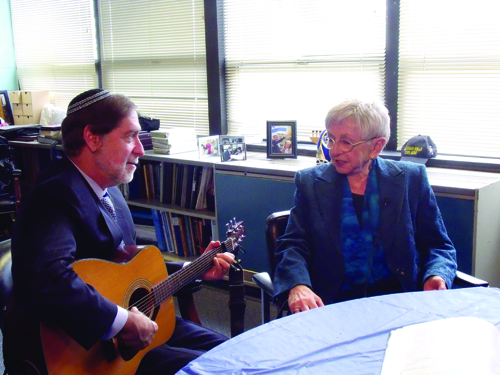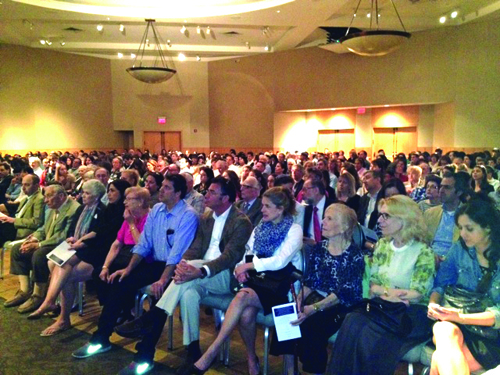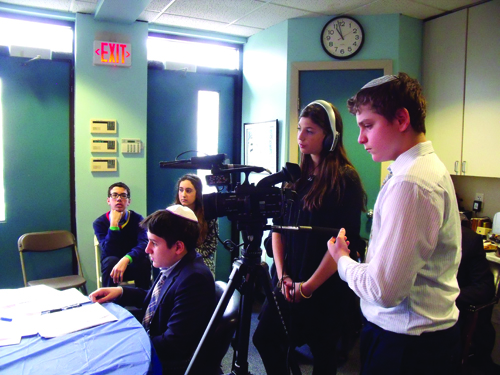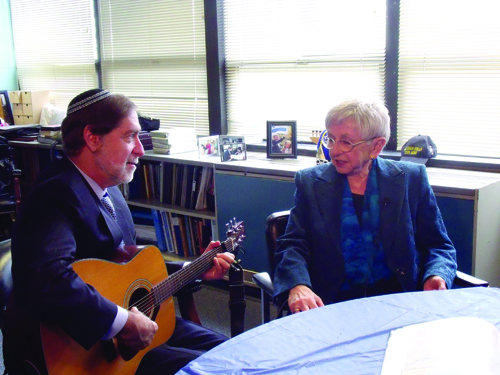

“You can study the Holocaust for the next 30 years and you can read hundreds of books on the subject, but if you do not get inside the mind and heart of someone who experienced a day in the life of the ghetto, someone who lived a day in Auschwitz or someone who said goodbye to their parents for the last time, you may KNOW a lot about the Holocaust, but you UNDERSTAND nothing.” With these words 43 Moriah 8th graders were launched last September on a journey they will never forget. Through Names Not Numbers, an oral history film project created by Jewish educator Tova Fish-Rosenberg, our students devoted three months to the formal study of the history of the Shoah as preparation for the researching, interviewing and filming of eight area Shoah survivors.

Following the three-month intensive study of Holocaust history led by principal, Dr. Elliot Prager, the Names Not Numbers participants were exposed to a variety of workshops leading up to their meeting with the survivors: a session on interview techniques with Jewish Week editor, Gary Rosenblatt, a visit to the Museum of Jewish Heritage and session with Project Director, Dr. Paul Rudensky; a lecture and discussion with Dr. Michael Berenbaum, former Project Director of the United States Holocaust Museum, filming techniques with professional filmmaker, Danielle Beeber, editing techniques with Tova Fish-Rosenberg and a session on “Faith After the Holocaust” with Dr. Prager.
During the first and second weeks of January, all of the foundational learning and preparation culminated in each of the eight groups of students meeting with and interviewing the survivor chosen for their group. None of the survivors held back, no one spared any details. Each told his/her unique story and in the one-hour of interview, each made an indelible impact on the students, all of whom took turns filming and interviewing. In the words of participant, Danielle Krim: “Name Not Numbers has given me something that has far surpassed my expectations. Prior to hearing our survivor’s experiences, I was certain that their stories would touch me, but I never imagined that they could possibly move me as if they had been told by my great-grandparents whose stories I never had the privilege of hearing first-hand. “
In the months that followed, the 43 members of Moriah’s Names Not Numbers group labored over the one-hour of footage they had shot for the interview, facing the daunting task of editing down each group’s film to seven or eight minutes. Led by eight parent mentors, each assigned to a group, the students experienced the tedious and painstaking work of a film editor, trying to reach a consensus as to what they most wanted to convey from their survivor’s testimony. By March, each group had to wrap up its work and submit to the filmmaker their final cut. And then began the long process of integrating all eight of the groups’ work into one coherent, compelling documentary.
On Monday night, June 3, at Congregation Keter Torah, the survivors and their families, the students and their families, along with a standing room only audience had the privilege of viewing the product of seven long months of devotion to telling the stories of those who have lived to bear witness. At the close of the one-hour and ten minute documentary, there was not a dry eye in the house. In the closing words of Dr. Prager, “There are no words to describe what we are all feeling at this moment; to all of our survivors sitting here with us tonight, we are grateful not only that you survived, but that, through your will to live and your determination to rebuild overwhelming Jewish life, you are a source of inspiration to all of us.” And with that, all 600 present rose to sing Hatikvah.











